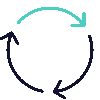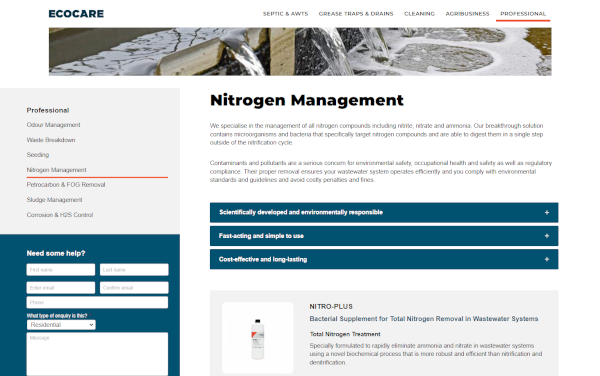CASE STUDY: Digital Performance Optimisation for EcoCare Australia

See how we increased ROAS by 4x through conversion rate optimisation and experimentation for one of Australia’s leading providers of wastewater treatment solutions.

Client Overview
EcoCare Australia, an innovative biotech company, specialises in innovative wastewater treatment solutions for both B2C and B2B markets. As a leader in the environmental sector, EcoCare Australia has an established reputation for delivering sustainable solutions that address water management challenges.
Despite their strong product offerings, the company faced challenges in converting website traffic into sales and maximising their return on ad spend across digital channels.


Challenge
EcoCare sought to scale their business but needed a partner who could diagnose performance bottlenecks and deliver measurable improvements across their digital marketing. The traditional channels that had served them well in the past were no longer delivering results, but their digital marketing efforts were not performing well enough.
EcoCare Australia approached us with two core objectives:
Increase Website Conversion Rate: Despite consistent traffic from various marketing channels, their website was not converting visitors into leads and sales at a rate that aligned with business goals.
Improve ROAS: While the company invested in digital marketing, the return on that investment wasn’t meeting expectations, leading to the need for greater efficiency and effectiveness in advertising spend.

Solution
Comprehensive Marketing Audit
To lay the foundation for growth, we conducted a thorough audit of EcoCare Australia’s digital marketing operations. This included:
- Google Analytics: An in-depth review of user behaviour and conversion paths to identify friction points on the website.
- Google Ads & Facebook Ads: A detailed examination of campaign structures, targeting options, keyword performance, and creative effectiveness to uncover opportunities for optimisation.
Conversion Rate Optimisation
Armed with insights from the audit, we implemented a rigorous CRO strategy that involved:
- Optimised Landing Pages: We redesigned, rewrote, and restructured key landing pages to enhance user experience, improve message clarity, and simplify navigation. The changes focused on streamlining the conversion funnel and aligning on-page content with the intent of paid traffic.
- Advertising Account Optimisation: Across Google and Facebook Ads, we fine-tuned the ad copy, targeting strategies, and bid adjustments. By creating a more granular account structure, focusing on high-intent keywords and refining audience segmentation, we ensured that ads reached the most relevant potential customers.
Expansion of Advertising Channels
To further amplify EcoCare’s reach and diversify their lead generation efforts, we introduced new advertising channels:
- Google Shopping Ads: For the B2C segment, we introduced Google Shopping Ads, leveraging product listings to attract highly targeted traffic. This helped to highlight EcoCare’s unique product range and drive conversions directly from search results.
- Retargeting Campaigns: We launched retargeting campaigns on Google Display and Facebook to re-engage users who had visited the website but had not converted. These campaigns were designed to nurture leads with personalised messaging, increasing the likelihood of conversion upon subsequent visits.

Results
Within just a few months of implementation, EcoCare Australia saw dramatic improvements in their key performance metrics:
Website Conversion Rate Increased by 2x: The optimisations made to landing pages and the enhanced user experience resulted in a doubling of the conversion rate, significantly boosting leads and sales.
Return on Ad Spend (ROAS) Improved by 4x: Through targeted advertising and optimised spending, EcoCare achieved a fourfold improvement in ROAS, transforming their digital marketing campaigns into a powerful revenue driver.
Get in touch with us to find out how we can help you better understand and action your data.
"*" indicates required fields
